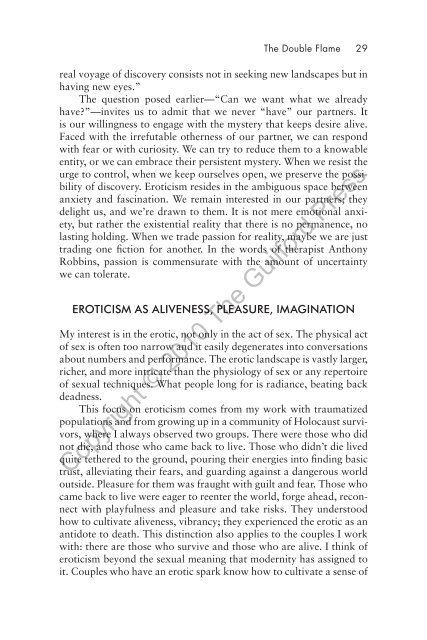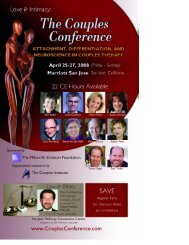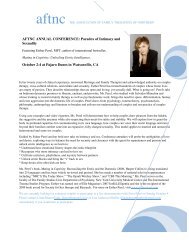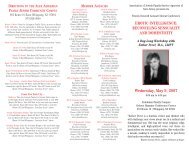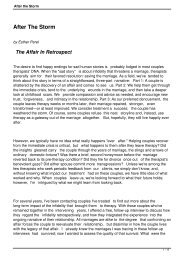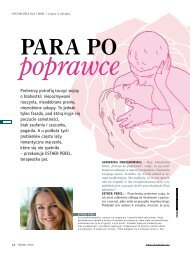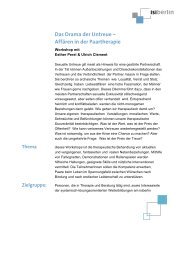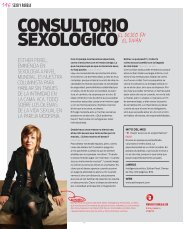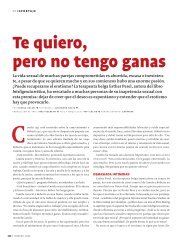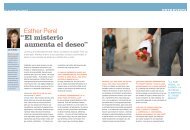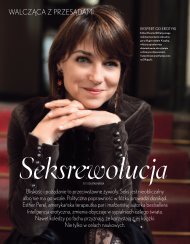The-Double-Flame 2.pdf - Esther Perel
The-Double-Flame 2.pdf - Esther Perel
The-Double-Flame 2.pdf - Esther Perel
Create successful ePaper yourself
Turn your PDF publications into a flip-book with our unique Google optimized e-Paper software.
<strong>The</strong> <strong>Double</strong> <strong>Flame</strong> 29<br />
real voyage of discovery consists not in seeking new landscapes but in<br />
having new eyes.”<br />
<strong>The</strong> question posed earlier—“Can we want what we already<br />
have?”—invites us to admit that we never “have” our partners. It<br />
is our willingness to engage with the mystery that keeps desire alive.<br />
Faced with the irrefutable otherness of our partner, we can respond<br />
with fear or with curiosity. We can try to reduce them to a knowable<br />
entity, or we can embrace their persistent mystery. When we resist the<br />
urge to control, when we keep ourselves open, we preserve the possibility<br />
of discovery. Eroticism resides in the ambiguous space between<br />
anxiety and fascination. We remain interested in our partners; they<br />
delight us, and we’re drawn to them. It is not mere emotional anxiety,<br />
but rather the existential reality that there is no permanence, no<br />
lasting holding. When we trade passion for reality, maybe we are just<br />
trading one fiction for another. In the words of therapist Anthony<br />
Robbins, passion is commensurate with the amount of uncertainty<br />
we can tolerate.<br />
EroTicism as alivEnEss, PlEasurE, imaginaTion<br />
My interest is in the erotic, not only in the act of sex. <strong>The</strong> physical act<br />
of sex is often too narrow and it easily degenerates into conversations<br />
about numbers and performance. <strong>The</strong> erotic landscape is vastly larger,<br />
richer, and more intricate than the physiology of sex or any repertoire<br />
of sexual techniques. What people long for is radiance, beating back<br />
deadness.<br />
This focus on eroticism comes from my work with traumatized<br />
populations and from growing up in a community of Holocaust survivors,<br />
where I always observed two groups. <strong>The</strong>re were those who did<br />
not die, and those who came back to live. Those who didn’t die lived<br />
quite tethered to the ground, pouring their energies into finding basic<br />
trust, alleviating their fears, and guarding against a dangerous world<br />
outside. Pleasure for them was fraught with guilt and fear. Those who<br />
came back to live were eager to reenter the world, forge ahead, reconnect<br />
with playfulness and pleasure and take risks. <strong>The</strong>y understood<br />
how to cultivate aliveness, vibrancy; they experienced the erotic as an<br />
antidote to death. This distinction also applies to the couples I work<br />
with: there are those who survive and those who are alive. I think of<br />
eroticism beyond the sexual meaning that modernity has assigned to<br />
it. Couples who have an erotic spark know how to cultivate a sense of<br />
Copyright © 2010 <strong>The</strong> Guilford Press


